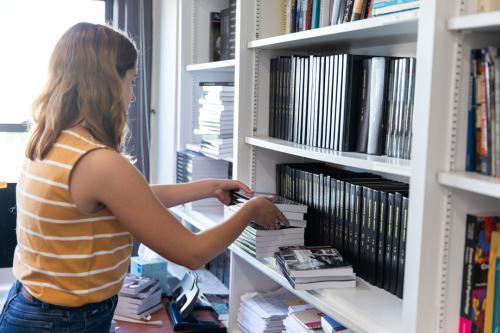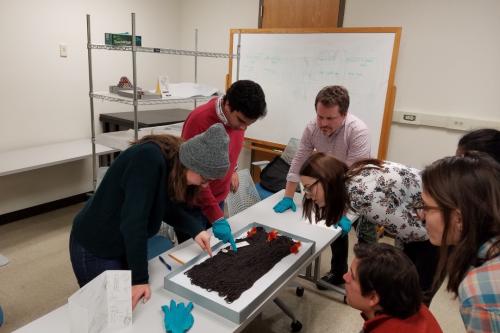Research Internships
Internships and independent research enrich the academic experience through professional training. Washington, D.C., offers once-in-a-lifetime opportunities at top policy and cultural institutions. Anthropology students in past internships have translated oral histories, photographed museum collections, prepared exhibits for display, created booklets and publicity materials and made distribution maps of animal species. Internships at museums and cultural centers can also be a valuable tool in learning how to communicate anthropology to the general public.
Internships and independent study are open to undergraduate and graduate students. (Note that the Human Paleobiology doctoral program has a separate internship requirement.) Students have three options to complete internships for credit: museums focus, development focus or a more general anthropology internship. Internships are distinct from independent research study projects, which may also be completed for credit.
Museum Internships
Students are invited to take advantage of internship opportunities at one of Washington, D.C.’s many cultural and historical museums. A museum internship must deal with an anthropological issue or topic; internships limited to clerical work or event hosting are not acceptable.
- Registration
-
Undergraduate or graduate students who wish to intern at a museum for credit must register for ANTH 6230. Before they complete registration, they should download and print the Museum Internship Packet. The Statement of Expectations form should be signed by the internship supervisor at the internship site and returned to the museum training concentration advisor by the end of the first week of class.
Note that ANTH 6230 is a variable credit hours course, and you must specify the number of credits when registering. For details, visit the GW Office of the Registrar website.
- Choosing a Site
-
The Department of Anthropology has internship agreements in place with the Smithsonian Institution, the Alexandria Archaeology Museum, the National Park Service, the National Museum of Health and Medicine, the Woodrow Wilson House and the Society for American Archaeology. Consult the departmental museum training concentration advisor if you are interested in a different institution.
- Requirements
-
Contact the museum training concentration advisor before arranging for an internship.
Students registered for the three-credit course must perform at least 10 hours of relevant work for 15 weeks.
Interns complete a 15-page research paper that relates their internship experience to a significant theoretical and/or methodological problem in anthropology.
This is a graduate-level academic paper and should contain a substantial bibliography (at least 15 sources).
The paper must be submitted to the museum training concentration advisor before the end of the final exam period for the semester in which the work was completed. The final grade is based on the recommendations made by the internship supervisor on the Final Evaluation of Internship Form and on the final paper.
The grade of I (Incomplete) is not given for internships. If the work schedule does not permit completion of an internship within one semester, the student should request an IPG (In Progress) from GW. Once the student has completed the work and been assigned a grade, the IPG disappears from the record.
Development Internships
Washington, D.C., provides an ideal location to learn on the job at international development agencies and organizations.
- Registration
-
Undergraduate or graduate students who wish to intern at a development organization for credit must register for the three-credit ANTH 6330 course.
- Choosing a Site
-
- Be sure to consult with Associate Professor Stephen Lubkemann before arranging for an internship.
- Visit the GW Career Center website to browse openings.
- Join groups (real or virtual) related to your career interests and use them to network.
- Publish a revised class paper, or present a paper at a conference. These activities increase your network and demonstrate a commitment to professionalism.
- Requirements
-
Work 8-10 hours per week for about 14 weeks.
Write a final 12-page, double-spaced report describing the organization and internship position, contributions made and lessons learned. Students should think about how the internship related to or advanced their professional goals. The final paper may include attached documents like meeting notes and newsletters completed during the internship.
It is recommended to keep a “field” journal as a record of daily events for reference when writing the final paper.
The grade of I (Incomplete) is not given for internships. If the work schedule does not permit completion of an internship within one semester, the student should request an IPG (In Progress) from GW. Once the student has completed the work and been assigned a grade, the IPG disappears from the record.
General Internships
Students may use the Independent Study course (ANTH 3995 for undergraduates, ANTH 6995 for graduate students) to conduct an anthropology-focused internship unrelated to museums or development. Students complete the course and write a final report, similar to the museum and development internship options. They also benefit from research guidance from the faculty advisor in charge of the course that semester.
Internship Sites
The Anthropology Department partners with several organizations on internship programs, and students have also chosen sites outside that list. All internship sites must be approved by the research advisor.
Past internship sites have included:
- Alexandria Archaeology Museum
- Amazon Alliance
- Department of Education National Institute on the Education of At-Risk Students
- Freer Gallery of Art and Arthur M. Sackler Gallery
- Interamerican Development Bank
- National Air and Space Museum
- National Museum of Health and Medicine
- National Museum of the Marine Corps
- National Park Service
- Organization of American States
- Pan American Health Organization
- Shaw Heritage Trust
- Smithsonian National Museum of American History
- Smithsonian National Museum of the American Indian
- Smithsonian National Zoo
- Society for American Architecture
- U.S. Department of State
- U.S. Senate and U.S. House of Representatives
- Woodrow Wilson House
- World Learning Visitor Exchange Program





